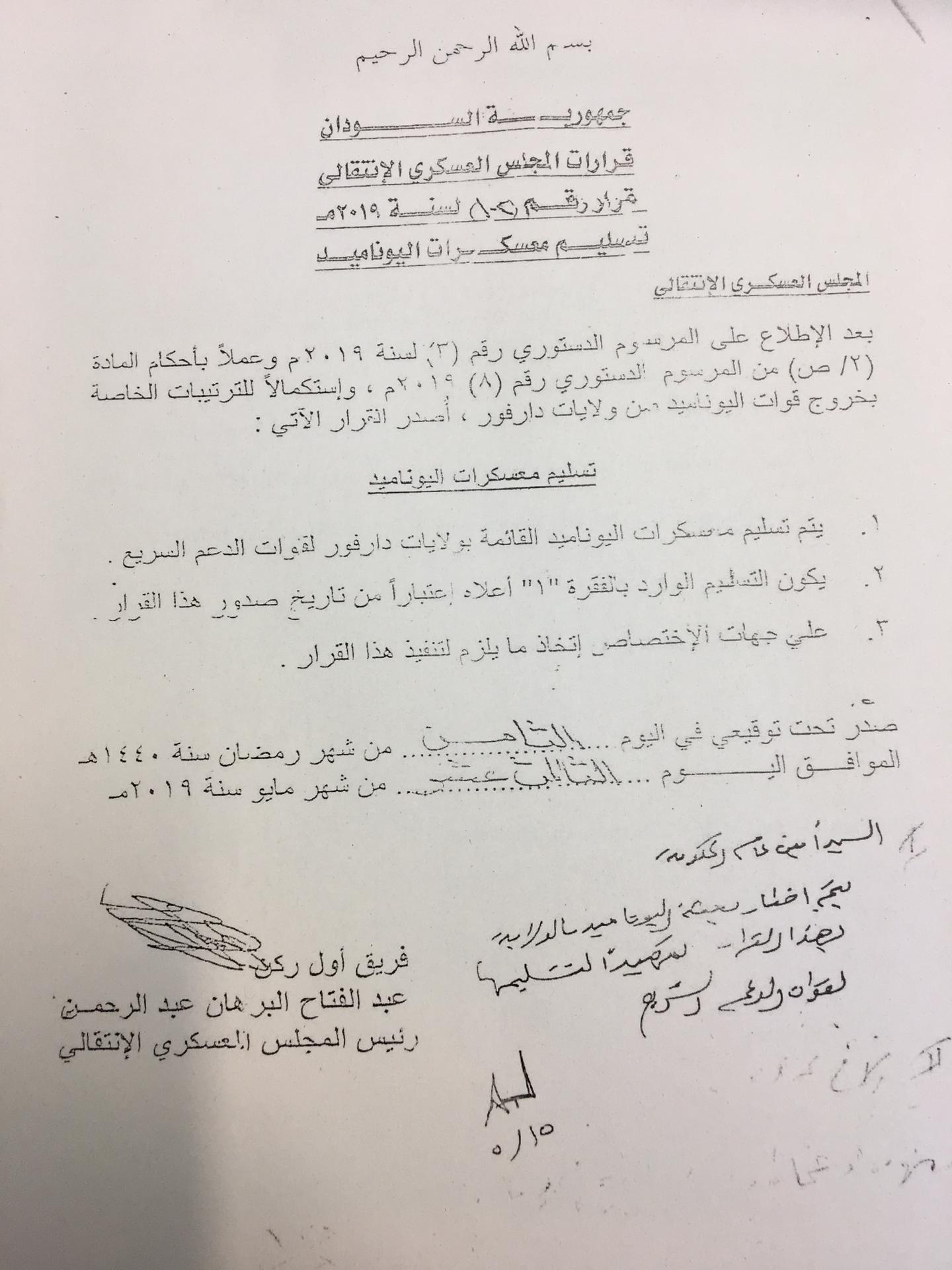A decree from the Transitional Military Council converting All UNAMID bases in Darfur to use by the Rapid Support Forces led by TMC Deputy Chair Lt. General Mohamed Hamdan Daglo (aka “Hemeti”)
Eric Reeves | May 28, 2019 | https://wp.me/s45rOG-9353
In an extraordinary act of contempt for the UN, the African Union, and international law, the Transitional Military Council (TMC) in Khartoum has issued a decree over the name and signature of “Lt. General Abdulfattah AL Burhan Abdulrahman, Head of TMC.” The decree, dated May 13, 2018, declares in full:
In the name of God, Most Gracious, the Most Merciful
Republic of Sudan
Decrees of the Transitional Military Council
Decree No. 102 for 2019
Handover of UNAMID camps
Transitional Military Council
Having considered constitutional Decree No. 102 of 2019 and pursuant to the provision of article two (2/) of constitutional Decree No. 8 of 2019, and complement for arrangements related to the exit of UNAMID from Darfur States, I issue the following decree:
Handover of UNAMID camps.
[1] UNAMID camps presence in Darfur States to be hand-over to Rapid Support Forces (RSF)
[2] The hand-over mentioned above in the paragraph 1 to be from the date of adoption of this decree.
[3] The relevant authorities shall take the necessary steps to implement this decision.
Issued under my signature on 13th May 2019
Lt. General Abdulfattah AL Burhan Abdulrahman
Head of TMC
The Arabic original, here translated, appears immediately below. It has been confirmed as authentic by a senior UNAMID official:
The clear agreement between the al-Bashir regime and UNAMID—both its African Union and UN components—was that the camps built for use by UNAMID would be handed back to Sudanese authorities for civilian use. Yet despite various public celebrations of camp turnovers and their new civic and humanitarian uses, all but one of the camps so far given up have been converted to bases for the Rapid Support Forces (RSF) of TMC deputy chair Lt. General Mohamed Hamdan Daglo (aka “Hemeti”), something formalized by al-Burhan’s decree. Hemeti has led the RSF since its formation in 2013 and remained as its head when the militia force was officially incorporated into Sudan’s armed services, although he was not made part of the chain of command, effectively creating a rival army to the official Sudan Armed Forces.
I have recently promulgated a statistical monograph looking at the violence, particular the RSF violence, in Darfur over the past two years | https://wp.me/p45rOG-2qm/. The monograph contains compendia of original source material, data spreadsheets with data representing the violence in the five Darfur states during this time (containing more than 800 data entry points), and finally a mapping of these data onto five discrete maps of the Darfur states. An examination of the maps and spreadsheets reveals just what a force for violence against civilians, almost exclusively non-Arab civilians, the RSF have been.
The monograph also contains the announcements from UNAMID of base hand-overs, and I include all relevant dispatches on these announcements in reverse chronological order, first for 2017 and then for 2018 – 2019.
Collectively, all the announcements—insofar as they specify benign civilian uses—are simply a series of lies, with no indication that UNAMID bases would in a short time be easily converted to RSF use. Such lies and habitual mendacity are nothing new for UNAMID, either its UN or African Union components and leaders. But this conversion of UNAMID bases violates the explicit agreement on civilian use that UNAMID and Khartoum negotiated. The conversion of UN peacekeeping bases to military purposes of any kind is clear violation of international law, and some would argue amounts to war crimes.
There is much to say about this decree and what it implies about the ambitions of the Transitional Military Council, especially with respect to Darfur. But it also speaks to the question of whether there is any intention of the TMC to make a transition to civilian governance; clearly there is no such intention when it comes to Darfur.
Moreover, it cannot be stressed enough that this has long been part of Hemeti’s vision of the future of Darfur and, we must surmise, Sudan. He has already become the primary determinant of whether there will be civilian governance in Sudan—or a reprise of the viciously repressive, grossly self-enriching, and finally genocidal al-Bashir regime.
